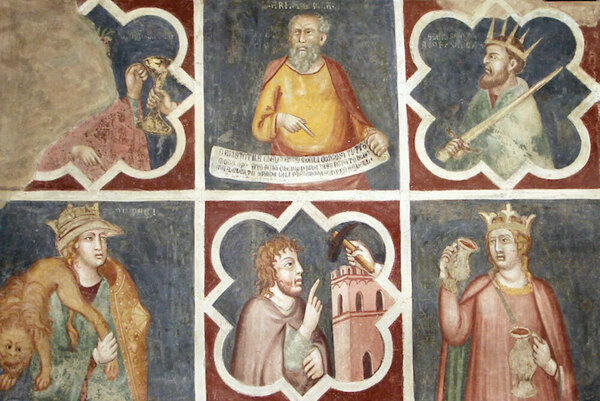Is it Risky to Read Aristotle in Italian? Prof. Eugenio Refini Explores the Perils and Possibilities of Vernacular Translation in Medieval Italy

On April 21st, Eugenio Refini visited the Medieval Institute as the sixteenth annual graduate-invited speaker to discuss the politics of translating Aristotle in 14th- and 15th-century Italy. In his talk, entitled "Whose Aristotle? Latinate Knowledge and Vernacular Translation in Medieval Italy," Refini discussed the medieval translation of philosophy as a highly fraught site where people negotiated conflicting agendas and desires—and as a place of agency and accessibility (albeit contained to the upper classes).
Refini began by discussing an episode in Il Novellino (The Hundred Old Tales), an anonymous 13th-century collection of 100 medieval short stories in Italian. One episode in particular displays the moral risks of translation into the vernacular: in story 78, a philosopher finds the "goddesses of Science" in a brothel, and when he asks why they are in such an unexpected place, they respond, “you are the one who brought us here!” As the text concludes, “not all things are adapted to all persons"—or all texts to all languages. Lofty philosophical texts should not demeaned and lowered by translation into Italian.
The Convivio ("The Banquet"), an unfinished book by Dante Alighieri, used the same metaphor to instead defend the act of vernacular translation. Dante remarked that the vernacular had been made into a prostitute not by translation, but by the education system: since classes were taught only in Latin, Italian was systematically disconnected from higher knowledge. Dante argued that it was critical for for noble people to study high-minded texts in their day-to-day language—to bring Italian back from the brothel into the university.

Still, translations into the vernacular continued to increase the accessibility and reach of philosophical works: Aristotle’s Nicomachean Ethics, for example, was popular among merchants, city administrators, and courtiers. Refini tracked the complicated translation history of the Ethics, which was translated from Greek into Latin and then Italian, but also popular as a short compilation. This abridged work prioritized the text's statements on moral conduct, which appealed to a wider readership than the full text's sometimes-arcane philosophy.
Compilation was not the only means of making the Ethics accessible to a broader swath of elites. The full-text and compendium manuscripts owned by Bonaccorso di Filippo Adimari, a 15th-century aristocrat, also included paratexts (marginalia and other markings), rubrics (titles and colored emphases), and a poem: Leonardo Bruni’s Canzone Morale, a philosophical song celebrating the Aristotelian tradition. Clearly, the scribe took an active role in repackaging the text to increase its practicality for younger and less scholarly readers.
As Refini demonstrated through images, textual analysis, and charts, vernacular translation involved a constant negotiation between the original text and the desires of active readers. Although translations of the Ethics remained aimed at an upper-class audience, Refini's talk pointed out not only the risk of cheapening great texts, but also the distant possibility of literature that all could enjoy.